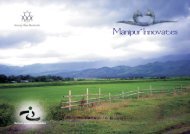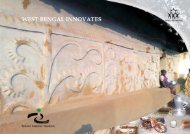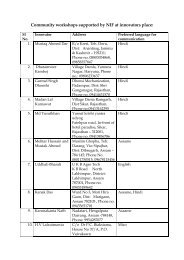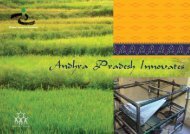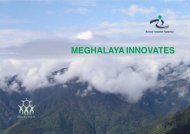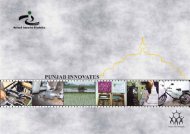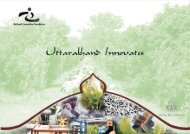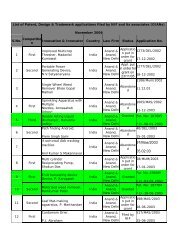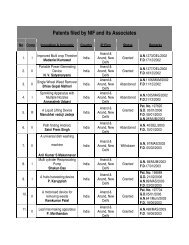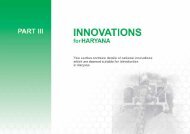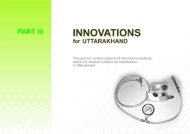Part I OF I Tamil Nadu.pmd - National Innovation Foundation
Part I OF I Tamil Nadu.pmd - National Innovation Foundation
Part I OF I Tamil Nadu.pmd - National Innovation Foundation
You also want an ePaper? Increase the reach of your titles
YUMPU automatically turns print PDFs into web optimized ePapers that Google loves.
PART I : INNOVATIONS FROM TAMIL NADU<br />
Relay Cropping<br />
S Vel Murugan, Madurai<br />
During ‘karthigai’-’margazhi’ (November-December) groundnut is sown as irrigated crop.<br />
Generally, bengal gram, cowpea are grown on the bunds. After 45 days when groundnut<br />
is weeded second time, seeds of cotton are planted and gypsum is applied in the field.<br />
Within three months, the groundnut can be harvested along with the oil seeds and pulses.<br />
Later on, the cotton is picked. When farmers stagger the planting dates for these crops,<br />
the costs of ploughing, making ridges and furrows as well as weeding and spraying can<br />
be reduced considerably. They can take advantage of three harvests in a single season.<br />
Honey Bee, 4(2&3):16, 1993<br />
Seed treatment methods<br />
V R Iyyappan, Reddiapatti village<br />
(a) Paddy: A gunny bag filled with paddy seeds is kept<br />
immersed in a water trough for 12 hours then the seed<br />
bag is immersed in diluted biogas slurry for another 12<br />
hours. This increases the resistance of seedlings to<br />
pests and diseases.<br />
(b) Maize: Seeds are soaked in cow urine for 12 hours<br />
before sowing.<br />
(c) Banana: The suckers are kept in hot water for a few<br />
minutes before planting.<br />
(d) Chilli: Seeds are immersed in biogas slurry for half<br />
an hour. This promotes vigorous growth and increases<br />
disease resistance in seedlings.<br />
TAMIL NADU INNOVATES 46




